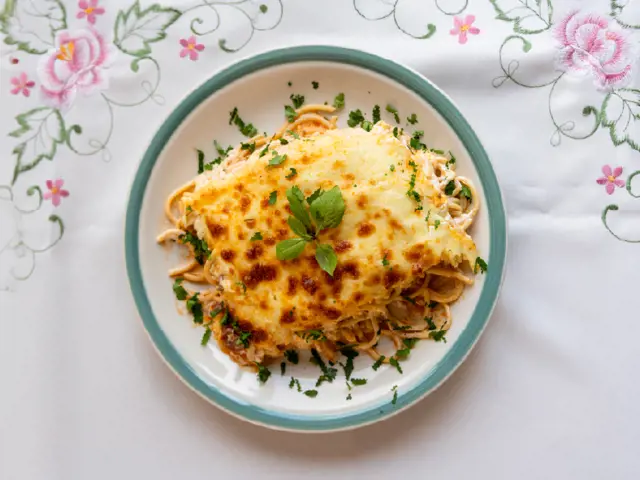


Bitterness usually comes from the pith (the white, soft part of the skin underneath the yellow outer zest). Ensure you use a proper tool such as a fine rasp or grater when you zest a lemon, and try to gather only the yellow rind, avoiding the white pith. When cooking a dish (such as roast chicken) with lemon in it, try to cut the slices thinly and always choose ripe, juicy fruit to maximize the sweetness and avoid too much pith. Alternatively, you can remove the rind and use just the fruit or juice, and add the zest separately, as in this recipe.
Lemon juice contains acid, which can break down the proteins in the meat if you use too much of it or leave it too long. However, the water in the juice, or slices of fruit holding in the moisture can help avoid the chicken becoming too dry. It all depends on how you use it. The most common reason chicken dries out is because it is overcooked – particularly lean cuts like chicken breast fillets. Always follow the recipe when it comes to using lemons or lemon juice and be careful not to overcook your chicken. While it should be cooked through, that doesn’t mean it is overcooked! If you’re having trouble with dry, tough chicken consider investing in a meat thermometer and using the temperature to check when it’s ready.
While this recipe does not require marinating, many chicken dishes use this process to help the flavors of herbs and spices absorb into the meat. If a dry rub is used, the chicken could be covered and left for a few hours, but for a marinade containing lemon juice, marinating for ten or fifteen minutes is often sufficient – no more than a couple of hours, to avoid the citrus overpowering the flavor of the meat.
For this recipe, we use chicken breast fillets, which is the whiter meat option. Some people prefer to use boneless chicken thighs – they are a darker meat, which will provide a richer flavor and more fat. Both would be suitable for this recipe, although if the thighs have skin on, we recommend the skin either be removed prior to pan-frying, or for it to be browned sufficiently.
Whether you’re inviting friends around for dinner, or just wanting something warm and tasty to please the family on a weeknight, this delicious yet simple chicken dish is sure to turn into a fast favorite.
Part of what makes this lemon chicken dish so special is its versatility. If you want to try something new (or if you just don’t like rosemary), a few sprigs of fresh thyme make a superb substitute. Standing true to its Mediterranean origins, with a focus on quality and simplicity, the quality of ingredients used in this dish can also make a real difference. Try sourcing some premium Mediterranean olives and see the flavors come to life. Green olives can also be used instead of black – but remember to watch out for pits if they haven’t been removed!
If you love to serve a mouth-watering roast chicken but don’t have the time or effort for all the preparation, this popular lemon chicken dish is a great choice – sure to please both you and your guests! For a larger group, the recipe is easy to scale up, and other accompanying dishes can easily be added, such as salads and roasted vegetables or a potato bake to replace the boiled potatoes.
This dish isn’t just a fabulous dinner – it also makes a great lunch the next day. Instead of potatoes, try substituting a grain such as bulgur for an alternative that is not only tasty, but great for soaking up all the leftover sauce!

Fall in love with pasta all over again, as you serve your loved ones creamy dishes made richer with Puck—and your special touch. Our inspiring recipes, general guidelines, and detailed articles will set you on the path to culinary creativity. With Puck’s entire range of cooking creams and sauces that meet your high standards, you’ll love putting your personal spin on pasta.